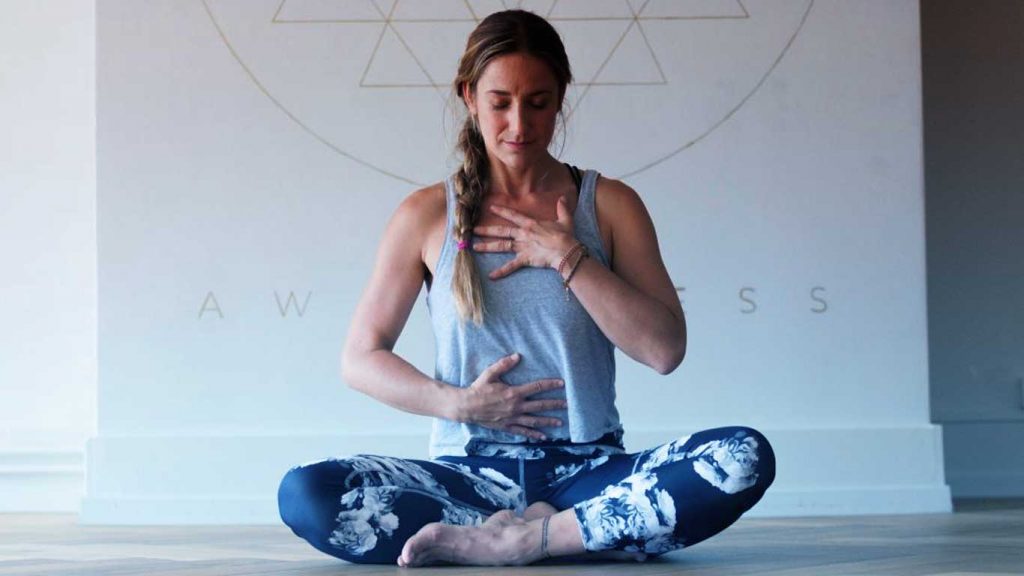Intentional deep, abdominal (or diaphragmatic) breathing in stressful situations can reduce our level of stress. Deep breathing can be beneficial in a wide range of everyday situations. Let’s take a closer look.
Why is abdominal breathing beneficial?
Breathing through the nose down to the abdomen is called deep, abdominal or diaphragmatic breathing. It’s essential for the full functioning of the lungs and to achieve the optimal exchange of gases.
When frightened or startled we stop breathing for a second. Think of those ‘took my breath away’ moments. Because our body needs more oxygen in response to threat, our stress response cleverly changes the relaxed rhythm of breathing to a more rapid and shallow one.
You can read about the stress response and its functions in our article What is the Stress response?.
So can we utilise the benefits of abdominal breathing in order to stop panic or fear? Can we intentionally change our breathing in order to become calmer?
Yes, we can. We can even double the benefits of diaphragmatic breathing if we intentionally focus on the breathing process itself. It helps disconnect us from our worry thoughts, while turning on the parasympathetic nervous system (or the ‘rest and digest’ response).
We know from Dr Stephen Porges, author of Polyvagal Theory, that this is because of the ‘wandering’ or vagus nerve that connects our brain to our internal organs. This bilateral connection ensures that if our body senses calm, then our mind relaxes too and vice versa.
3 abdominal breathing techniques to reduce anxiety
1. Simple seated breathing exercise
Sit comfortably with your back straight but relaxed. Place one hand on your chest and the other on your abdomen. Notice how your chest and abdomen are moving while you breathe. Gently focus on your inhalation as you take air in through your nose. Don’t force it, just breathe normally.
Try to drive the air down to your belly and feel your tummy rise. With a little practice you can start feeling your diaphragm pushing down expanding your abdomen as your lungs fill with air.
Abdominal breathing will elicit the body’s relaxation response. As the breathing becomes slower:
- metabolism decreases
- heart beats slower
- muscles relax
- blood pressure drops
- heart rate variability increases
2. Hot chocolate breathing
This is a fun technique. Imagine that you are holding a mug of steaming, hot chocolate in your hand. Pretend that you want to smell this luxurious drink before taking a sip. Take a deep breath through your nose, as if smelling the hot chocolate. Hold it in for one count, as if enjoying the smell. Then let it out as slowly as you inhaled.

You can use cues in your daily life to remind yourself about practising deep breathing:
- When you go outside at any point during the day, take deep breaths of fresh air as described above.
- Keep a tissue handy, with a drop of essential oil on it, and breathe in its fragrance.
- When you make physical changes from sitting to standing or from standing to sitting, use it as a reminder to take deep breaths.
- And if you feel stress rising in you, use it as a reminder to breathe deeply.
3. Box breathing
The US Navy SEALs use box breathing techniques to maintain calmness under pressure and to optimise their oxygen intake. There are many different box breathing techniques, but all based on similar principles.

Inhale through your nose to the count of 4 or more if that is possible for you. Ensure that you breathe into your tummy and get the diaphragm engaged. Hold your breath to the count of 4. Then exhale to the same count that you used for inhaling: 4 or more. Visualising a square or a rectangle and moving your finger along the sides in one direction may help you master this exercise.
Yoga incorporates breathing techniques into the practice. For detailed instructions of three pranayamas see video from Caren Baginski below.



